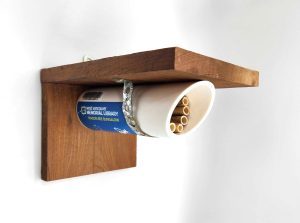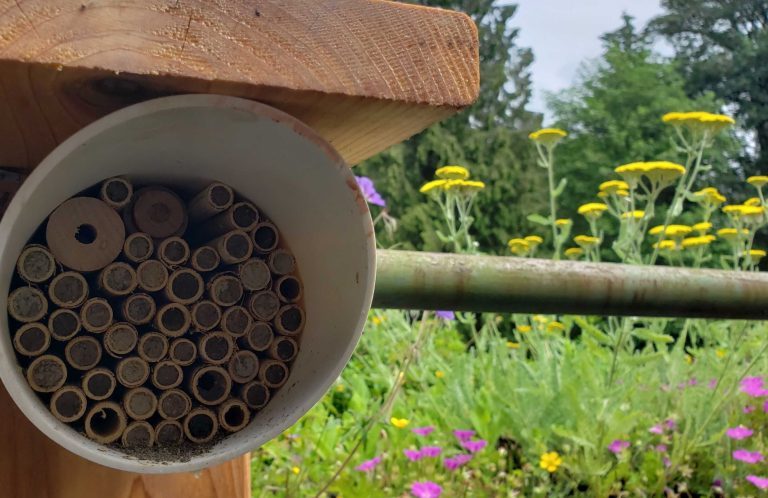Have you ever wanted to raise native mason bees in your community garden, backyard, or apartment balcony? Don’t know where to start? Have you tried to attract mason bees before with little success? Join the Library’s resident mason bee expert, Taren Urquhart, for a 90-minute interactive lecture. You will learn everything you need to know to entice mason bees to your garden this spring.
Topics covered:
- Lifecycle of the mason bee.
- How to construct a simple bee house.
- Best practices for attracting mason bees to your yard.
Note: This lecture is intended for an adult audience. Teens are welcome to attend with adult/parent involvement.
After attending this lecture, participants will be eligible to borrow a WVML Mason Bee Bungalow. The bungalow is the perfect starter home for anyone looking to experiment and learn more about these fascinating bees. Each home comes with 10-15 live, dormant mason bee cocoons from the Library’s Bee Hotel and Bee Tree (located on the rooftop garden and Storyhouse balcony) to help establish your first bee colony. Registrants who do not require a bee house are eligible to take home bee cocoons if stock remains.

Common questions you might have before registering for this program:
- What is a mason bee, and where do they live?
The mason bee (aka Blue Orchard Mason Bee) is a solitary species native to North America. It is an early pollinator of early-blooming fruit trees, shrubs, and flowers.
- What do mason bees look like?
They are small and solid black or bluish-black. They look somewhat like a housefly.
- Do mason bees sting? Do they make honey?
Mason bees do not sting and are very gentle, making them a pleasure to attract around children and pets. No bees native to North America make honey.
- Will a mason bee house attract any other stinging insects to my property?
No, only the female solitary mason bee is attracted to the drilled holes or tubes of a mason bee home. Stinging insects, such as hornets and wasps, are only interested in larger cavity spaces where they can raise many offspring in a social colony with a queen at its center.
- Why should I attract bees to my backyard?
With many of our native bees and non-native honeybee populations in decline due to a changing climate, pesticide use, and mite infestations, providing a sustainable habitat for these important pollinators is important.
- Can I raise mason bees if I live in an apartment?
If you have seen bees attracted to flowers on your balcony before, you are a great candidate to try experimenting with mason bees. We have conducted several experiments in our local area and found the following attributes are important: balcony should face south if possible, no higher than the fifth floor, and provide early blooming flowers (food source) alongside your bee house.
Please email Taren Urquhart directly with any other questions or concerns you do not see listed above, which will not be covered in the lecture topics: turquhart@westvanlibrary.ca.
Note about Registration:
- Registration will open on Monday, January 13 at 10 a.m.
- Due to the popularity of this program, only one Bee Bungalow will be lent per household.
- Choose one person in your household to “Register for the lending house program.”
- For any other household members, please “Register for lecture” only.

